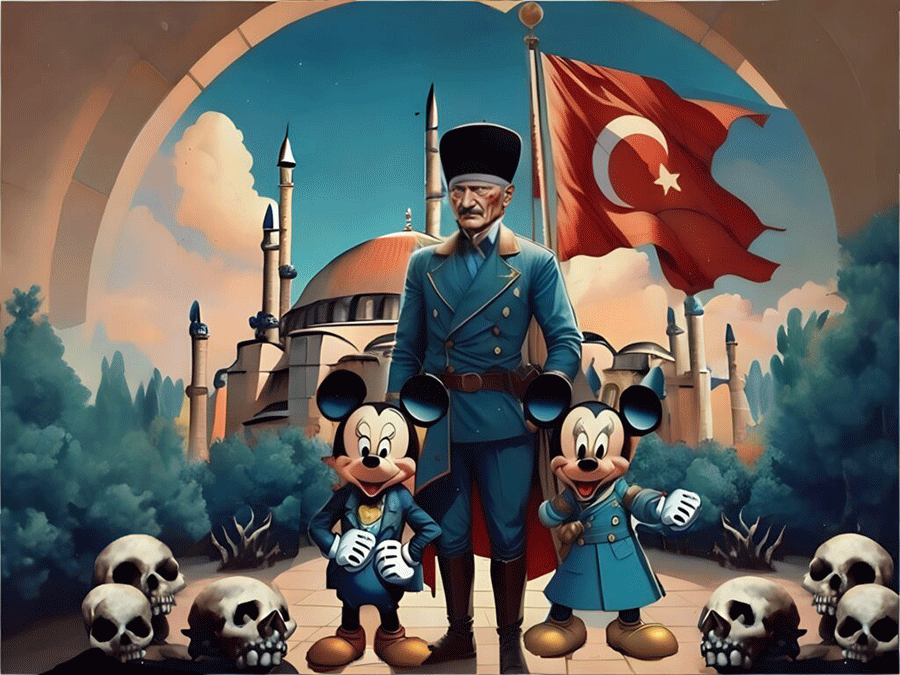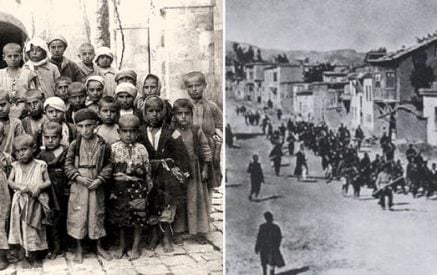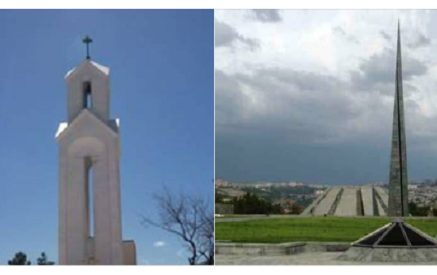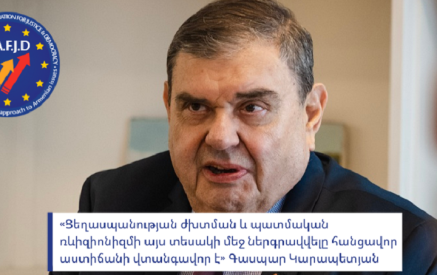by Ruby Topalian
On October 29, 2023, Disney+ is set to release a mini-series titled Atatürk to commemorate the 100th anniversary of the proclamation of the Turkish Republic. According to IMDb, the series “tells the story of the life of the Great Leader Mustafa Kemal Atatürk.” However, the use of the adjective “Great” in this description paints an overwhelmingly positive image of this highly controversial man. To many in Turkey, he is the ultimate hero and founder of the Turkish Republic; but to Armenians, Kurds, Greeks, progressive Turks, and all those who were subject to his genocidal agenda during and after World War I and the Armenian Genocide, he is nothing short of a mass murderer.
After the Armenian National Committee of America (ANCA) tweeted about the series on Wednesday, June 29, calling for its cancellation given Atatürk’s role in the death of hundreds of thousands, controversy around the series online has skyrocketed. The ANCA’s initial tweet—the start of what has become the #CancelAtaturk movement on Twitter—has generated over six million views, and upwards of ten media outlets have published articles furthering the conversation around whether Disney should cancel production and abandon this project.
Read also
During World War I, Atatürk served as a commander in the Ottoman military and worked closely with Talaat and Enver Pasha—the main orchestrators of the Armenian Genocide. After WWI ended, he continued communication with Enver and eventually rebelled against him to found the Turkish National Movement (also known as the ‘Kemalist’ movement) and create a “Turkey for Turks” in the wake of what he deemed the incompetence of the existing, crumbling Ottoman regime and to quell the rising power of the Empire’s ethnic minorities. As the Entente powers started appropriating Eastern provinces of the Empire to the newly-declared Armenian Republic, Atatürk retaliated in 1920 and declared war on the Armenians leading to the murder of up to 250,000 Armenians in less than three months.
Atatürk furthered his anti-Armenian policies by publishing a book in 1927 titled Nutuk (“the speech”) which he himself admitted to publishing for the purpose of writing (or rewriting) the official modern history of Turkey. In it, he wrote that the British imagined the idea of the Armenian Genocide to provide an excuse for their invasion of Istanbul in 1920. Moreover, he added that the Armenians were carrying out a policy of “extermination” against the Muslims of the Turkish Republic, not the other way around.
Atatürk’s “Turkey for Turks” not only excluded Armenians but also demanded the murder and systemic erasure from memory of every other ethnic minority that stood in the way of his vision. In 1922, Atatürk was responsible for the burning of the Greek city of Smyrna, killing over 600,000 Greek civilians and leaving 300,000 refugees with nowhere to turn. After World War I, Atatürk’s forces continued the Assyrian Genocide (Sayfo) that had killed upwards of 750,000 Assyrians in the Hakkari mountains and beyond, allowing his soldiers to rape young girls and sell others into harem slavery. Under Atatürk’s rule, 8,000 Christians were deported from Mesopotamia into the interior of Turkey, and by 1945, only 20,000 Assyrians lived in Iraq.
Then in 1937, Atatürk led his nationalist militia to the Kurdish-populated region of Dersim—a region occupied by the Kurdish people since the 16th century—and carried out an aggressive military campaign using aerial bombs and poison gas, leading to the murder of up to 45,000 Kurds. Just as Atatürk ensured that Smyrna was given the Turkish name “Izmir,” he renamed Dersim “Tunceli.”
Over the course of his 22-year reign, 28,000 topographic names were changed, as Atatürk made it his mission to “rewrite” history as president of the new Turkish Republic and erase not only the genocides that he and his predecessors were responsible for from the historical record, but the very cultures and memory of the people they had slaughtered as well. If Atatürk didn’t destroy property formerly owned by ethnic minorities within the Ottoman Empire, he used it to compensate the génocidaires’ families, claiming that the property had been ‘abandoned.’
This policy of denialism continues in Turkey today with the Armenian and Greek genocides carved out of Turkish school history curricula and the very term “Armenian Genocide” banned within Turkish parliament. Atatürk’s complicity in cultural erasure was the consummation of genocide: the attempt to eliminate not only the physical presence of ethnic minorities but every remaining vestige of their existence and memory.
Online, many are arguing that Disney’s decision glorifies a historical villain with some comments comparing Atatürk to Hitler. Looking at the history of Nazism and its ties to Turkey and Atatürk, there is indeed historical basis to these claims. In 2014, historian Stefan Ihrig wrote a book published by Harvard University Press titled Atatürk in the Nazi Imagination outlining this relationship. Ihrig explains that during an interview in 1938 with Turkish politicians, Adolf Hitler said, “Ataturk was a teacher; Mussolini was his first and I his second student.”
While many Turkish Twitter accounts such as Turkish Archives have retaliated by tweeting about the supposedly positive mark that Atatürk left on the world, criticizing the ANCA and others for their condemnation of a figure so beloved by the Turkish people, Disney’s complicity in whitewashing the abuses of genocidal regimes is not without precedent and raises the question of why these seemingly misinformed production decisions continue to be made. In 2020, the corporation landed in hot water after it was discovered that the live-action movie Mulan had been filmed in the Chinese province of Xinjiang, the same region where approximately one to two million Uighur Muslims were forced into internment camps.
Given the negative press Mulan generated, will Disney reconsider the release of Atatürk? Since public disapproval of Disney’s filming in Xinjiang didn’t stop the multi-billion dollar corporation from releasing Mulan, signs are pointing to no. However, Disney’s complacency in conjunction with news that Emma Watson is believed to be starring in the series, is generating more and more online backlash daily. “Disney is known for its fairytales, but this one is beyond the pale,” Richard Ghazal, executive director of In Defense of Christians (IDC), said.
Ancestors of those killed by Atatürk’s policies are not holding back either. “I encourage Disney to do some basic research on the founding of the Turkish state, drenched in the blood of millions of innocent lives. Ethnic minorities like the Kurds are still paying the price of Atatürk’s racist and violent policies in today’s Turkey,” Diliman Abdulkader, president of American Friends of Kurdistan, said. Endy Zemenides, executive director of the Hellenic American Leadership Council added: “Disney’s impact on the American public gives it great responsibilities […] Atatürk is a historically significant figure for many reasons, and one of them is his culpability for Christians becoming an endangered species in Turkey. That HAS to be part of the story.”
In an effort to place direct public pressure on Disney, popular Armenian news outlet 301.am has posted a fully-drafted email for members of the public to send out, calling for the cancellation of the series, complete with the emails of 27 Disney executives on its website. Similarly, the ANCA is calling on Disney employees allied with “Armenians, Greeks, Assyrians, Kurds, Christians, journalists, rights advocates or other victim groups persecuted by Turkey” to send confidential notes to [email protected].




























































